The raw data that fuels artificial intelligence, especially computer vision models, is often unstructured and meaningless to a machine on its own. To make sense of visual data, models require meticulously labeled images and videos. This is where image annotation services become critical, providing the human-powered or AI-assisted process of tagging and labeling data to train machine learning algorithms. Whether you're developing autonomous vehicles, improving medical diagnostic tools, or building advanced retail systems, the quality of your annotated data directly determines the performance of your AI models.
Finding the right partner or platform for this task is a significant challenge. The market is filled with options, each offering a different mix of tools, workforce management, and quality control mechanisms. This comprehensive guide is designed to simplify that decision-making process. We will dive deep into the top image annotation services and platforms available today, from fully managed enterprise solutions to open-source tools for in-house teams.
Before diving into the specifics of annotation, it's beneficial to understand the broader landscape of how AI is revolutionizing image processing. For a comprehensive guide, explore how to start mastering AI for photography. This article will provide a detailed overview of each service, including:
- Key Features: What sets each platform apart.
- Ideal Use Cases: Who benefits most from their specific offerings.
- Practical Considerations: Insights into pricing, implementation, and potential limitations.
Each entry includes screenshots and direct links, helping you quickly assess which solution best fits your project's scope, budget, and technical requirements. Our goal is to equip you with the information needed to select a service that will not just label your data, but will also help ensure the success of your AI initiatives.
1. Zilo AI – Image Annotation
Zilo AI’s Image Annotation service stands out as a premier choice for organizations seeking highly accurate and scalable data labeling for sophisticated computer vision projects. Positioned as a comprehensive solution, it caters to a wide spectrum of needs, from startups developing their first AI models to large enterprises refining complex systems. The service’s core strength lies in its human-powered approach, leveraging skilled technical and linguistic experts to ensure nuanced, context-aware annotation that automated tools often miss.
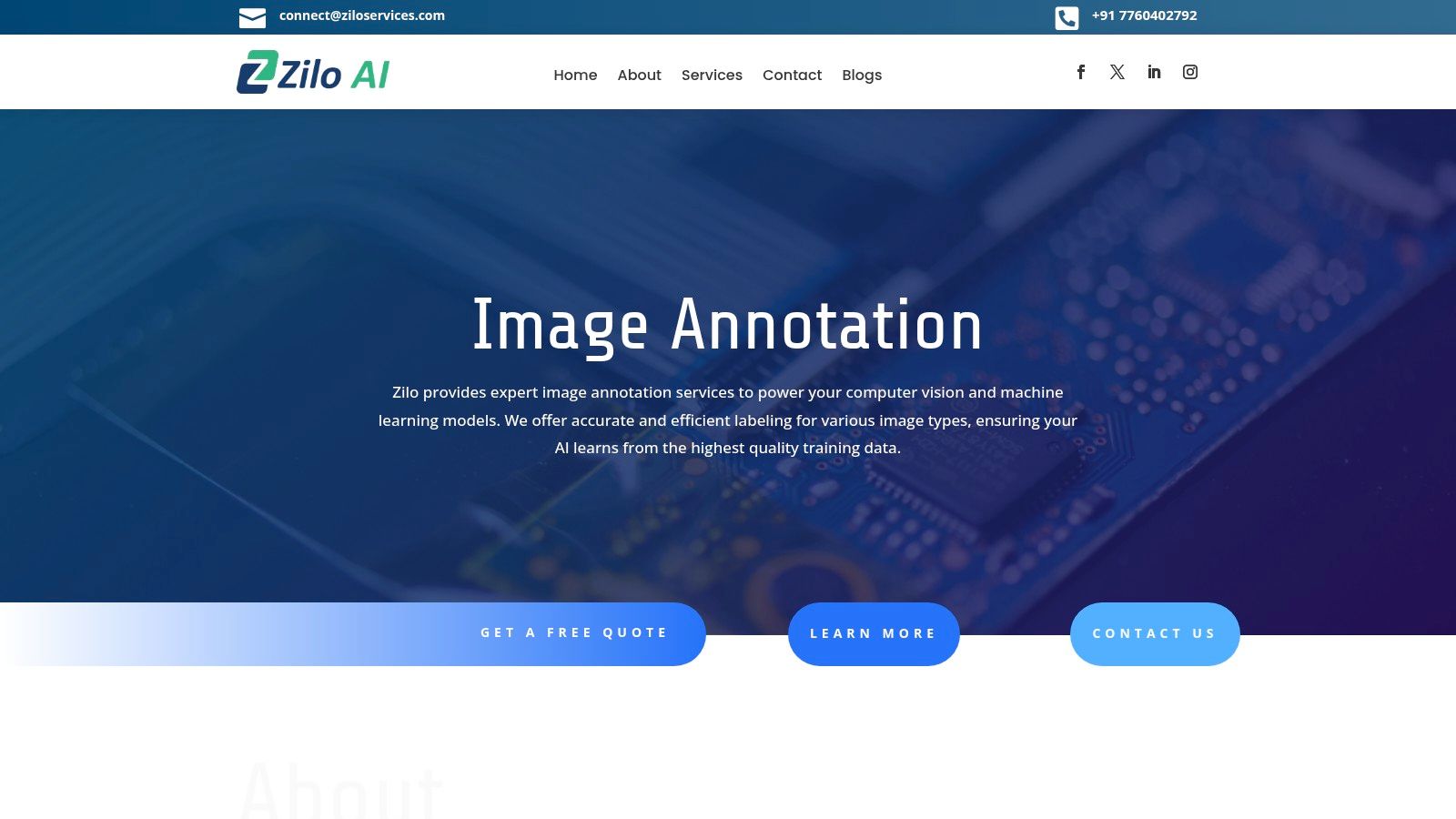
This focus on expert quality directly translates to superior training data, accelerating model development and boosting predictive accuracy. Zilo AI’s offering is not just a service but a strategic partnership, designed to provide the foundational data integrity necessary for building robust and reliable AI. For startups, understanding the importance of high-quality data is paramount; you can discover why data annotation is critical for AI startups to build a solid foundation.
Key Strengths and Use Cases
Zilo AI excels by combining a versatile toolkit with deep domain expertise, making it a powerful choice for specialized industries like autonomous vehicles, medical imaging, and retail analytics.
- Comprehensive Annotation Types: The platform supports a full range of techniques, including bounding boxes, polygons, semantic segmentation, and keypoint annotation. This versatility ensures they can handle diverse datasets for object detection, facial recognition, and scene understanding.
- Expert-Driven Accuracy: Unlike purely software-based solutions, Zilo AI’s team of human annotators brings a layer of cognitive understanding to the process. This is critical for projects requiring subjective interpretation or fine-grained detail, such as identifying subtle defects in manufacturing or classifying complex medical scans.
- Scalable and Flexible Operations: The service is structured to support projects of any size. Clients can request personalized quotes, allowing for tailored workflows that align with specific timelines and budget constraints. This flexibility makes it an accessible option for both pilot projects and large-scale, ongoing data labeling needs. While this service focuses on preparing data for AI, other advancements, such as learning how to generate images with AI, showcase the diverse applications of AI in visual content creation.
Practical Considerations
While Zilo AI offers a premium, expert-led service, potential users should note that pricing is not available upfront and requires a direct inquiry for a custom quote. This model ensures tailored solutions but may add a step to the initial evaluation process. Similarly, turnaround times can vary based on the complexity and volume of the project, a standard trade-off for high-quality, meticulous annotation work.
Website: ziloservices.com/image-annotation/
2. Amazon SageMaker Ground Truth (AWS)
Amazon SageMaker Ground Truth is a fully managed data labeling service designed for enterprises deeply integrated into the Amazon Web Services (AWS) ecosystem. It streamlines the creation of high-quality training datasets for machine learning models by offering human-in-the-loop pipelines. This platform is not just a tool; it's a component of the larger AWS ML stack, providing native integration with services like Amazon S3 for data storage and SageMaker for model training.
What sets Ground Truth apart is its focus on automation and efficiency. It employs active learning, a machine learning technique where the model identifies data that needs human review, significantly reducing the manual annotation workload and costs. This approach supports a variety of computer vision tasks, including image classification, object detection, and semantic segmentation. The ability to use a combination of automated labeling and human annotators (from your own private team, third-party vendors, or Amazon Mechanical Turk) provides immense flexibility. For businesses committed to leveraging data for strategic advantage, this platform is a key enabler. Understanding how such tools fit into a broader strategy is crucial, as explored in articles about data-driven decision making.
Key Considerations
Ground Truth’s primary advantage is its seamless workflow within AWS. For teams already using SageMaker, it’s a natural extension for managing data labeling jobs without leaving the environment.
- Pros:
- Enterprise-Grade Security: Leverages AWS’s robust security and compliance framework.
- Native Integration: Connects effortlessly with S3 and the entire SageMaker suite.
- Powerful Automation: Auto-labeling and active learning features reduce time and expense.
- Cons:
- Opaque Pricing: Pricing is quote-based and not publicly listed, requiring direct contact.
- Ecosystem Lock-in: It delivers maximum value only for organizations already on AWS.
Website: https://aws.amazon.com/sagemaker/groundtruth/
3. Labelbox
Labelbox positions itself as a comprehensive data engine, moving beyond a simple tool to offer an integrated platform for creating, managing, and improving training data. It combines sophisticated annotation software with on-demand labeling services, making it a flexible solution for teams of all sizes. The platform is particularly strong in handling complex computer vision tasks, supporting various data types including images, video, text, and geospatial data.
What makes Labelbox a preferred choice among image annotation services is its emphasis on collaboration and iteration. It provides a robust suite of tools, from bounding boxes and polygons to advanced semantic segmentation, all within a powerful editor. The platform facilitates a model-assisted labeling approach, where your own models can pre-label data to accelerate human review. For organizations needing to scale quickly, Labelbox offers access to a marketplace of vetted labeling teams, combining the benefits of a SaaS platform with the workforce of a managed service. This hybrid model allows businesses to maintain control over their data pipeline while leveraging external expertise as needed.
Key Considerations
Labelbox’s strength lies in its unified platform that addresses the entire data labeling lifecycle, from annotation to quality review and model diagnostics. Its transparent, unit-based pricing is also a significant differentiator.
- Pros:
- Mature Workflows: Offers strong automation, quality assurance, and project management features.
- Hybrid Model: Combines powerful software with optional, integrated labeling services.
- Transparent Pricing: Provides a usage calculator and a clear, unit-based model (LBUs), plus a free tier for small projects.
- Cons:
- Abstract Cost Modeling: The Labelbox Unit (LBU) pricing can be difficult to forecast initially.
- Feature Gating: Many advanced automation and enterprise features are restricted to higher-priced tiers.
Website: https://labelbox.com/
4. Scale AI
Scale AI positions itself as an end-to-end data engine for enterprises, focusing on delivering high-quality, production-ready data for ambitious AI projects. It provides a managed service that combines advanced software with a human-in-the-loop workforce, specializing in large-scale and complex computer vision programs. The platform is designed for organizations that require immense volumes of meticulously labeled data and offers a comprehensive suite covering data collection, curation, annotation, and model evaluation.
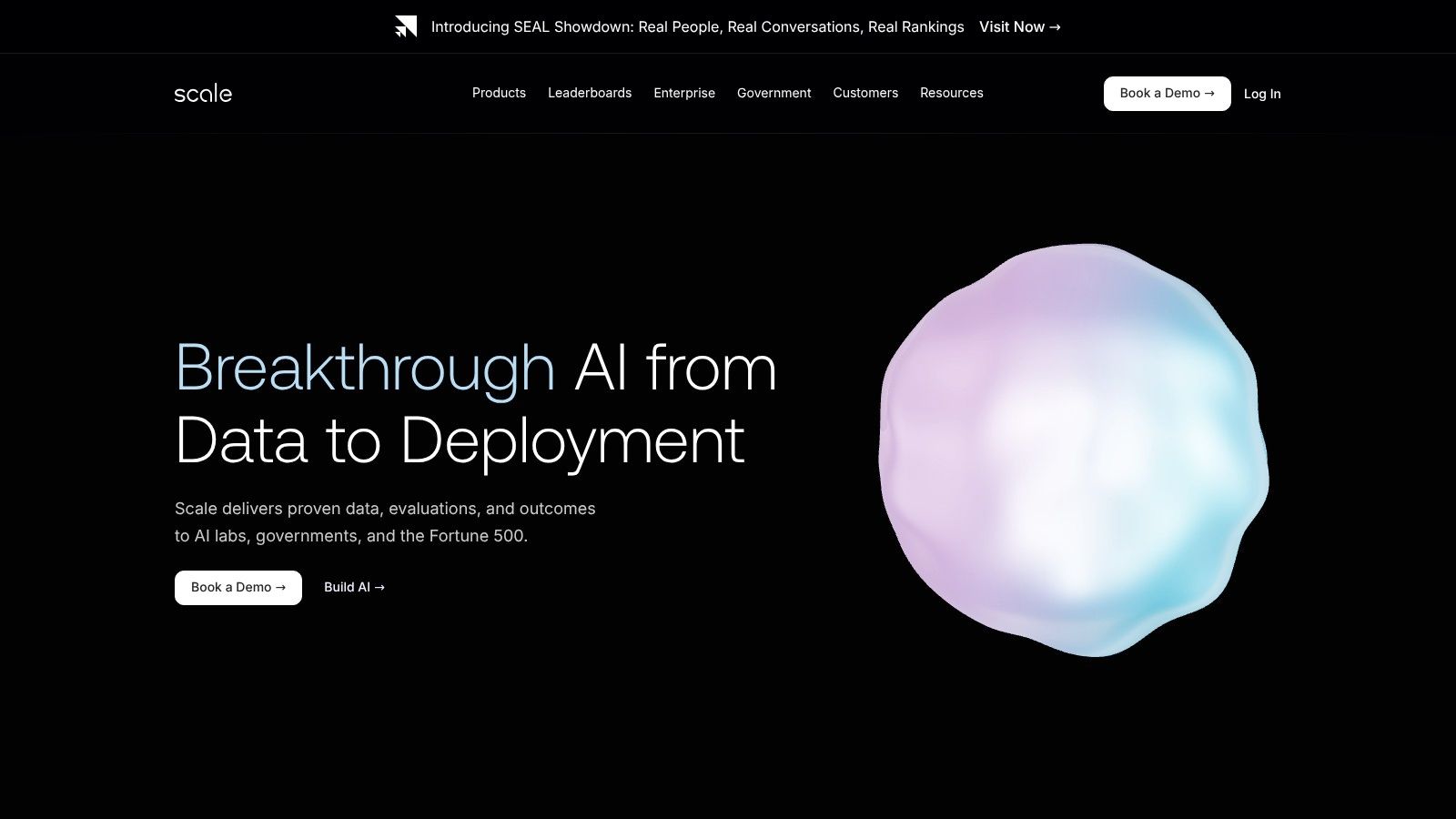
What differentiates Scale AI is its enterprise-first approach, providing not just a tool but a full-service partnership. It deploys domain-expert annotators and implements rigorous, multi-layered quality control pipelines to meet stringent accuracy requirements, making it a go-to choice for industries like autonomous driving, robotics, and AR/VR. This focus on project delivery rigor and its proven ability to handle massive service-level agreements (SLAs) make it one of the leading image annotation services for mission-critical AI applications. The platform’s robust APIs and integrations are built to seamlessly fit into production-level MLOps workflows.
Key Considerations
Scale AI is best suited for well-funded enterprises with large, ongoing data needs that can justify the investment in a premium managed service. Its value proposition is centered on quality, reliability, and scale, rather than just tooling.
- Pros:
- Proven Capability at Scale: Demonstrated success with very large volumes for industry leaders.
- Comprehensive Service Offering: Extends beyond annotation to data curation and model evaluation.
- Enterprise Project Rigor: Strong onboarding, project management, and quality assurance.
- Cons:
- Enterprise-Tier Pricing: Pricing is quote-only and typically aligns with large enterprise budgets.
- Potential Organizational Risk: Recent strategic changes could be a consideration for long-term partnerships.
Website: https://scale.com/
5. SuperAnnotate
SuperAnnotate is a comprehensive data operations platform that combines advanced image annotation services with robust project management and automation capabilities. It caters to enterprises that require a high degree of security, quality control, and efficiency in their data labeling pipelines. The platform is designed to handle complex computer vision tasks, offering a suite of sophisticated tools for everything from semantic segmentation and pose estimation to Optical Character Recognition (OCR).
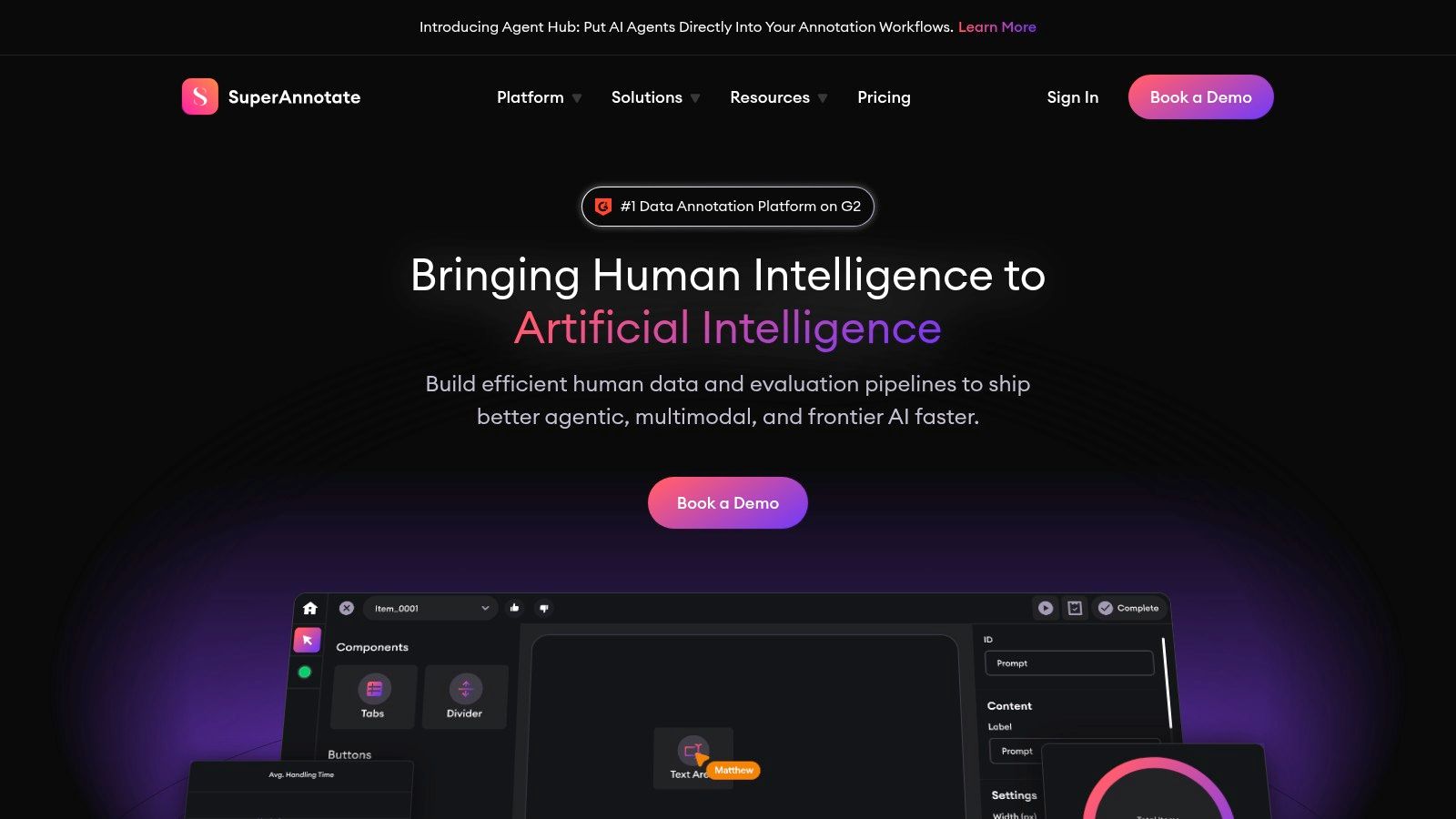
What makes SuperAnnotate stand out is its integrated approach, merging powerful software with human-in-the-loop flexibility. It features SAM-powered “Magic” tools that significantly accelerate the labeling process, alongside detailed analytics for quality assurance and workforce management. Users can manage their in-house teams, or they can tap into a marketplace of vetted, specialist annotation service providers directly through the platform. This model is particularly beneficial for organizations dealing with sensitive data, as SuperAnnotate maintains strict security compliance with standards like SOC 2, HIPAA, and GDPR.
Key Considerations
SuperAnnotate is built for teams that need to scale their data annotation efforts without compromising on quality or security. Its modern tooling and flexible workforce options make it a strong contender for demanding AI projects.
- Pros:
- Advanced CV Tooling: Fast, modern tools with AI-powered automation to boost annotator speed.
- Flexible Workforce: Option to source vetted specialist annotation teams directly from a marketplace.
- Enterprise-Level Security: Strong compliance posture (SOC 2, HIPAA, GDPR/CCPA) for sensitive data.
- Cons:
- Complex Pricing: Pricing details are not self-serve and require a demo and consultation.
- Learning Curve: The rich feature set may require dedicated onboarding for teams to fully utilize its power.
Website: https://www.superannotate.com/
6. Label Studio (by HumanSignal)
Label Studio is a highly popular open-source data labeling platform that offers exceptional flexibility for a wide range of annotation projects. It empowers teams to create completely custom labeling interfaces tailored to their specific needs, from simple image classification to complex computer vision tasks. While its open-source nature is a major draw, HumanSignal also provides managed cloud and enterprise editions, offering a scalable path for growing teams that need more support and managed infrastructure.
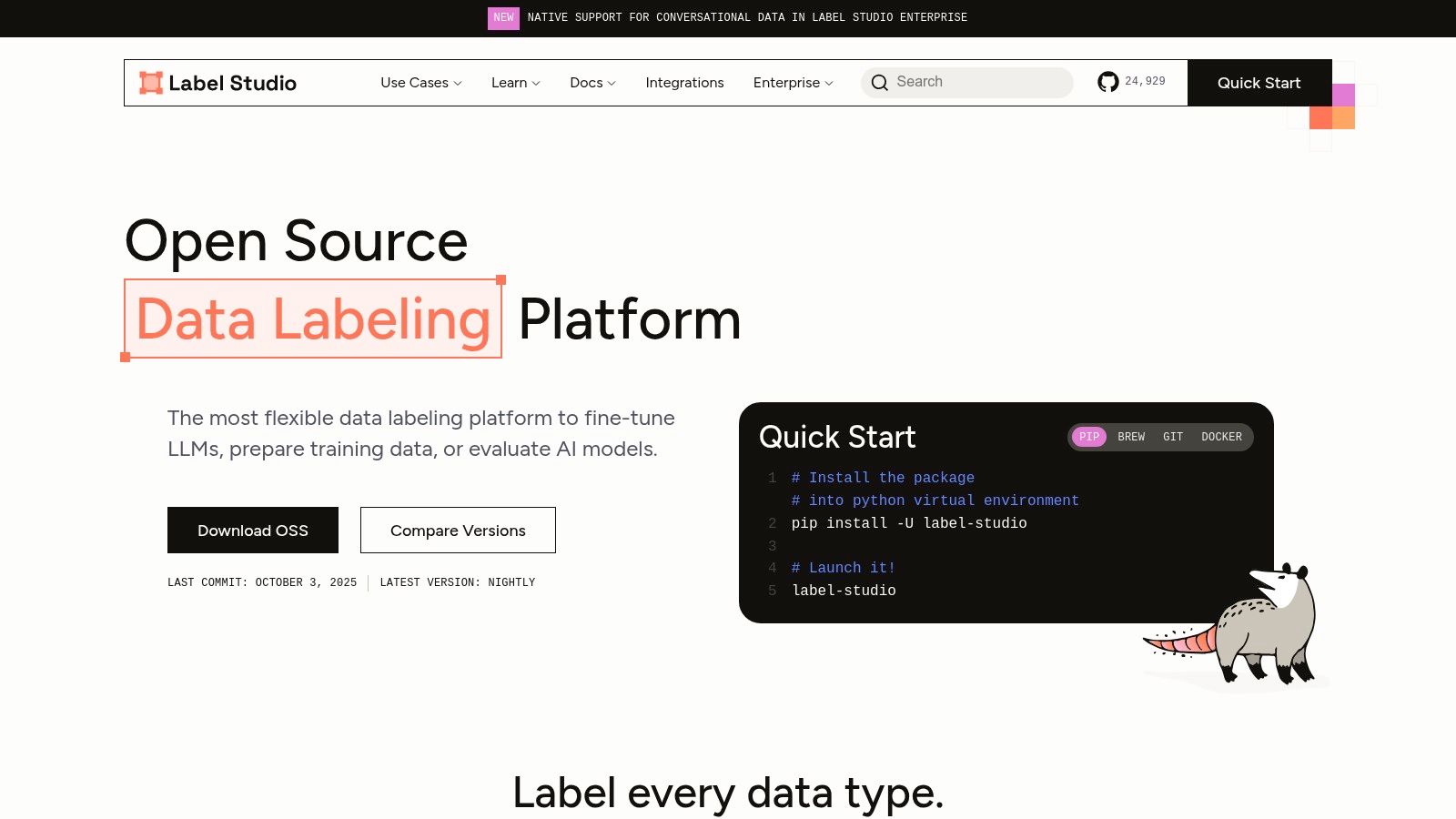
What makes Label Studio stand out is its developer-centric approach combined with an active community. The platform supports ML-assisted labeling and active learning loops, allowing teams to integrate their own models to pre-label data and accelerate the annotation process. This adaptability, along with integrations for cloud storage like AWS S3 and Google Cloud Storage, makes it a powerful hub for data-centric AI development. It is one of the more versatile image annotation services for teams that want full control over their labeling environment.
Key Considerations
Label Studio's core strength is its configurability, making it suitable for both simple projects and highly specialized, complex annotation tasks. The choice between self-hosting and a managed plan allows organizations to balance control with convenience.
- Pros:
- Open-Source Core: The free community edition provides powerful features and full control.
- Transparent Pricing: The managed Starter Cloud plan has clear, simple pricing for small teams.
- Strong Community: Extensive documentation and a large user base offer excellent support.
- Cons:
- Cloud Limitations: The Starter Cloud plan has user and feature caps.
- Setup Overhead: Self-hosting the open-source version requires technical setup and maintenance.
Website: https://labelstud.io/
7. CVAT.ai
CVAT.ai is a leading open-source computer vision annotation tool that has evolved into a comprehensive platform offering SaaS, enterprise, and professional labeling services. Originally developed by Intel, its open-source roots make it a favorite among developers and researchers who need a powerful, customizable tool without initial investment. It supports a full suite of annotation types, including bounding boxes, polygons, semantic segmentation, and keypoints, making it adaptable for nearly any computer vision project.
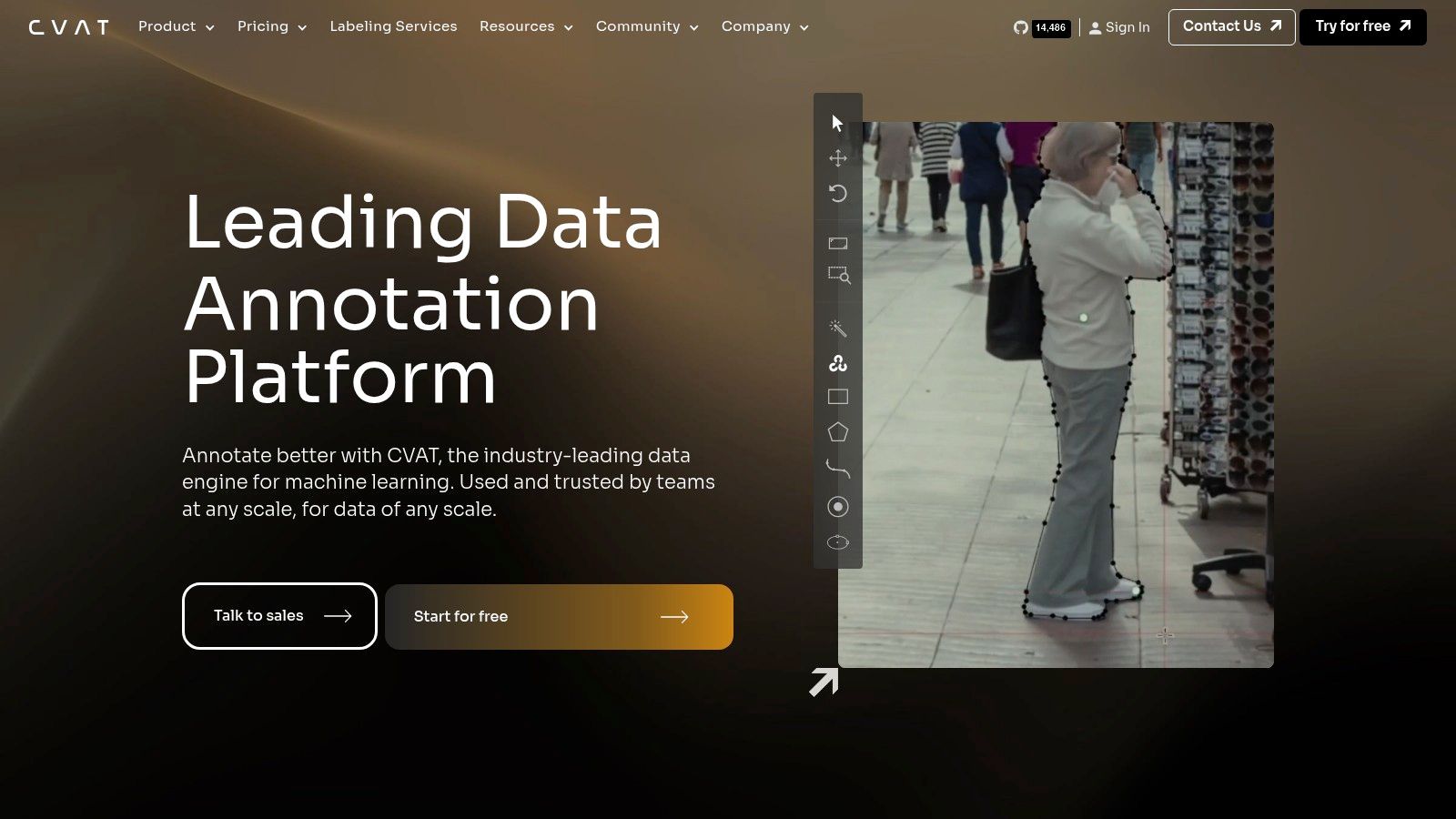
What sets CVAT.ai apart is its flexibility. A team can start with the free, self-hosted community version and later scale to the CVAT Online SaaS or enterprise solutions for added features like team management and cloud storage. This scalability, combined with professional in-house labeling services, creates an all-in-one ecosystem. The platform also integrates seamlessly into common ML workflows by supporting popular export formats like COCO and YOLO. This blend of open-source power and commercial support makes it an excellent choice for teams that want control over their tools while having access to professional image annotation services when needed.
Key Considerations
CVAT.ai’s primary advantage is its powerful open-source foundation, providing a robust, community-backed tool that can be deployed anywhere. The addition of commercial services offers a clear growth path for projects as they scale.
- Pros:
- Powerful Open-Source Tool: The free, self-hosted software is highly capable and customizable.
- Flexible Deployment: Offers community, SaaS, and on-premise enterprise versions.
- Multiple Export Formats: Easily integrates with diverse training and development workflows.
- Cons:
- Paid Tiers for Advanced Features: Key collaboration and management tools are reserved for paid SaaS plans.
- Minimum Commitments for Services: Professional labeling services may have minimum budget requirements.
Website: https://www.cvat.ai/
8. Dataloop.ai
Dataloop is a comprehensive, end-to-end data platform specifically engineered for unstructured data like images and video. It positions itself as a "data engine" for AI, combining powerful annotation tools with robust automation and data management capabilities. The platform is designed to support the entire data lifecycle, from labeling and quality assurance to model training and human-in-the-loop validation, making it a strong contender for teams managing continuous data operations.
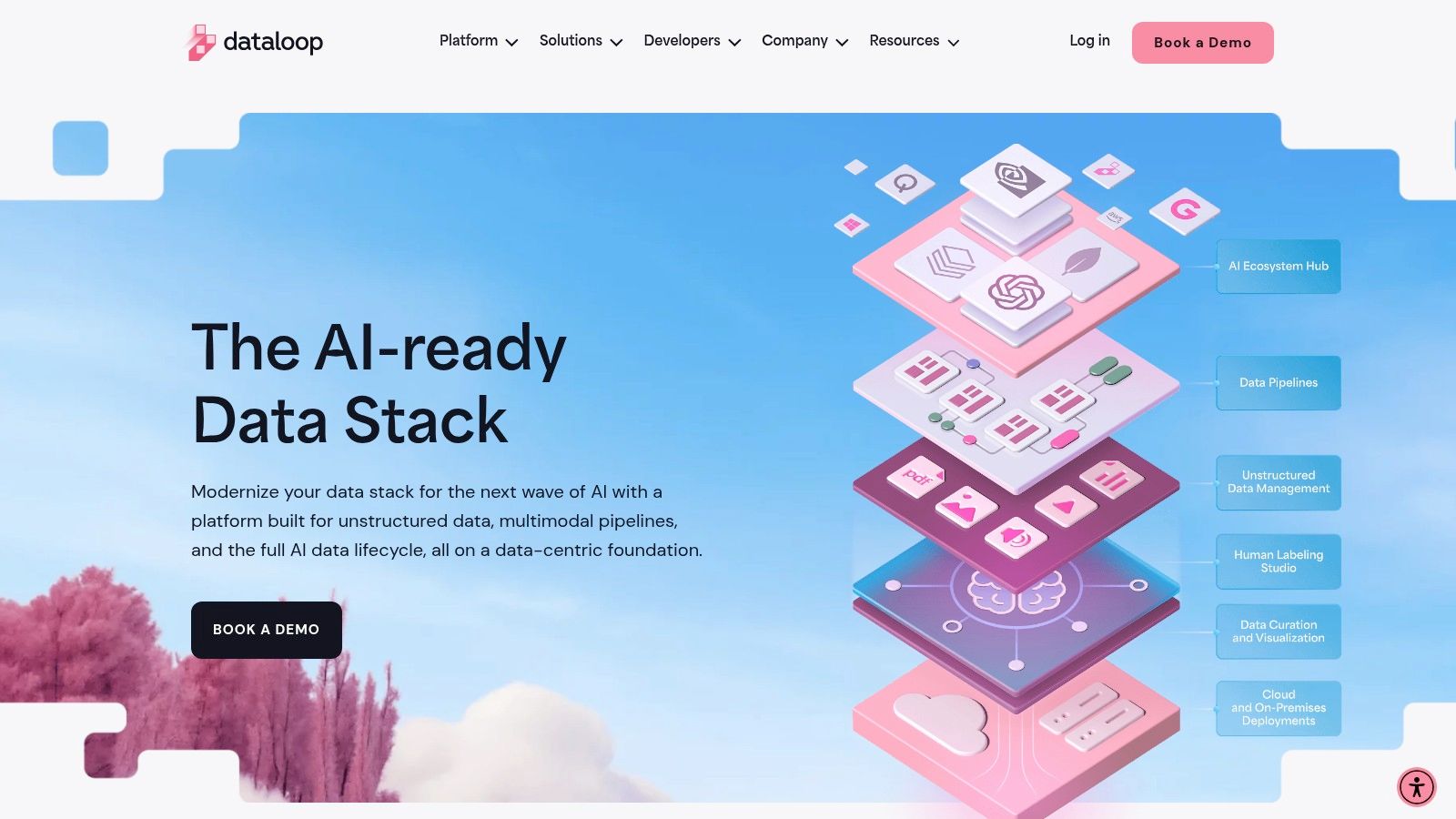
What distinguishes Dataloop is its emphasis on automation and orchestration. The platform features a sophisticated annotation studio with AI-assisted labeling and a serverless functions-as-a-service (FaaS) environment for creating custom data processing pipelines. This allows teams to automate repetitive tasks, integrate their own models for pre-labeling, and build complex validation workflows. This focus on programmatic data operations makes it one of the more powerful image annotation services for organizations aiming to scale their AI development and continuously improve model performance with real-world feedback.
Key Considerations
Dataloop’s main advantage is its holistic approach, providing a unified environment for data annotation, quality control, and pipeline management. This is ideal for enterprises that need to orchestrate complex data workflows across multiple teams and projects.
- Pros:
- Strong Automation: Advanced orchestration and serverless functions enable custom pipelines.
- Continuous Operations: Designed to support the full data lifecycle, from annotation to production.
- Integrated Services: Offers both the platform (SaaS) and managed annotation services.
- Cons:
- Pricing Is Not Public: Requires a demo or direct sales contact to get a quote.
- Potential Complexity: The platform's extensive features might be overwhelming for small teams or simple projects.
Website: https://dataloop.ai/
9. Sama
Sama is a managed data annotation provider that distinguishes itself with a strong focus on ethical AI and high-quality, secure data labeling for enterprise-grade computer vision projects. Instead of a self-service platform or a crowdsourced model, Sama employs a dedicated, in-house workforce operating from secure facilities. This approach provides clients with a reliable, scalable, and highly trained team for complex annotation tasks, ensuring consistency and precision for sophisticated machine learning models.
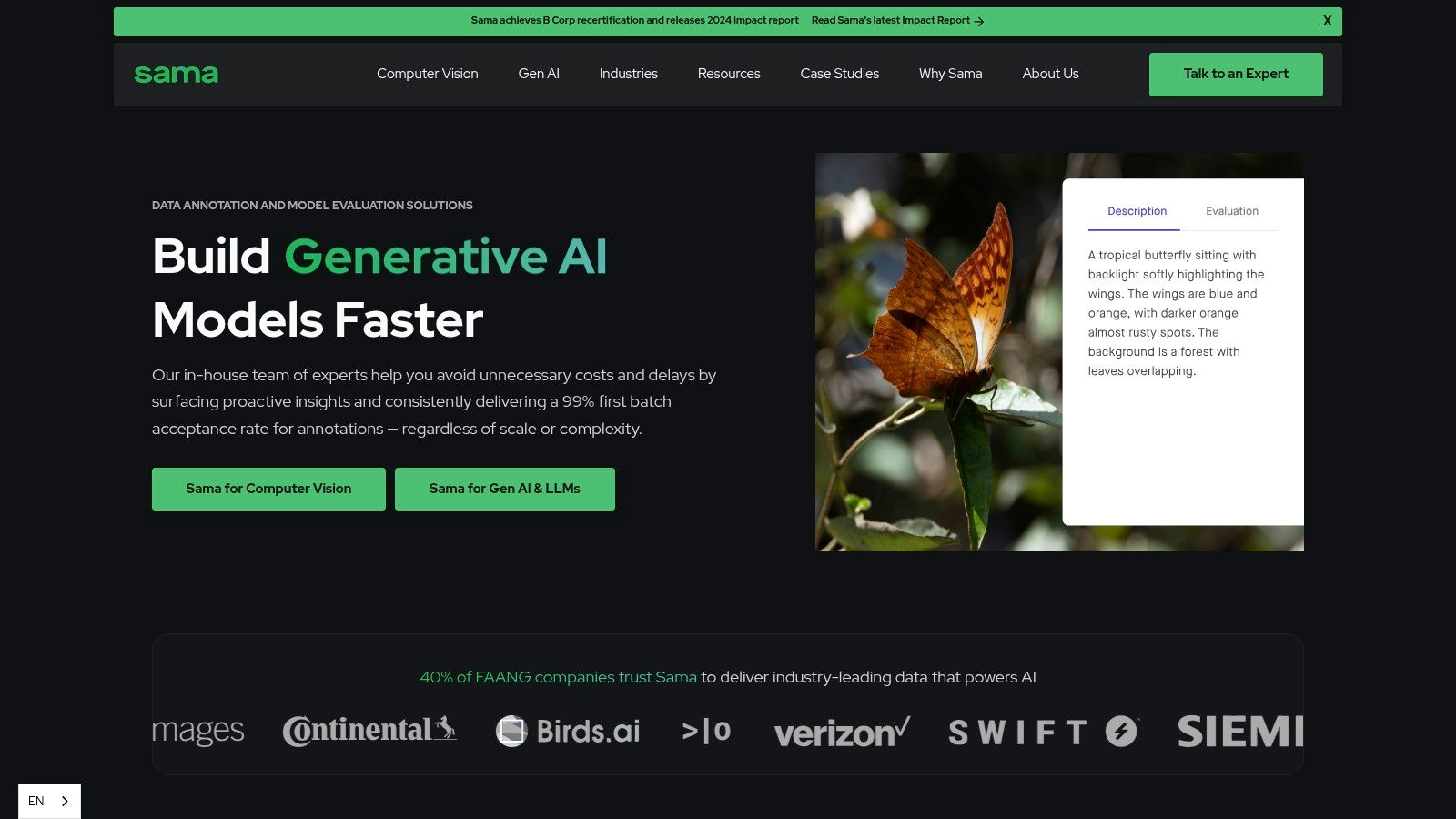
The company’s core strength lies in its comprehensive, service-level agreement (SLA)-driven quality assurance frameworks. Sama collaborates closely with clients to establish clear quality benchmarks and uses a combination of human-in-the-loop and automated checks to deliver datasets with high first-batch acceptance rates. Their commitment to security and compliance is demonstrated through certifications like SOC-2 and TISAX, making them a trusted partner for industries with stringent data privacy requirements, such as automotive, retail, and agriculture. For businesses needing a fully managed, expert-led solution, Sama’s model offers a compelling alternative to tool-centric image annotation services.
Key Considerations
Sama is best suited for large organizations that require a high-touch, fully managed service with robust security and quality guarantees, rather than a DIY software tool.
- Pros:
- High Security & Compliance: Utilizes biometric-secure facilities and holds certifications like SOC-2.
- Exceptional Quality: Employs a trained, managed workforce and proactive QA to ensure data accuracy.
- Scalable for Complex Projects: Proven ability to handle large-volume, intricate annotation programs.
- Cons:
- Enterprise-Focused Pricing: Quote-only pricing model is designed for large-scale enterprise contracts.
- Longer Onboarding: The managed service approach typically involves a more extended setup period than self-serve platforms.
Website: https://www.sama.com/
10. iMerit
iMerit is a well-established, US-headquartered provider that delivers fully managed image annotation services with deep domain expertise. Specializing in complex, large-scale projects, the company has built a strong reputation in the autonomous vehicles, medical AI, and geospatial intelligence sectors. iMerit operates as a strategic data partner, offering end-to-end solutions that combine human-in-the-loop annotation with sophisticated technology and rigorous project management.
What distinguishes iMerit is its workforce of skilled, in-house annotators who are trained for specific industry verticals. This approach ensures a higher level of contextual understanding and data accuracy for intricate tasks like 3D sensor fusion for AVs or tumor identification in medical imagery. They provide a full suite of computer vision services, from simple bounding boxes to complex semantic segmentation and LiDAR annotation. For companies looking to understand the competitive landscape of providers, it's helpful to see how iMerit fits within its regional context, as detailed in explorations of top data annotation companies.
Key Considerations
iMerit is best suited for enterprises that require a high-touch, managed service with guaranteed quality, security, and scalability for mission-critical AI projects.
- Pros:
- Deep Vertical Expertise: Specialized teams for AV, medical, geospatial, and other complex fields.
- Proven at Scale: Strong track record of delivering on high-volume, complex annotation projects.
- Enterprise-Grade Delivery: Focus on security, compliance, and reliable US-based client management.
- Cons:
- Custom Pricing: No public pricing; all projects require a custom quote and proposal.
- Longer Lead Times: Complex project setups can result in longer initial timelines compared to self-service platforms.
Website: https://imerit.net/
11. Toloka
Toloka is a versatile data labeling platform that uniquely combines a global, on-demand crowd workforce with both self-service and managed service options. It caters to a wide range of projects, from simple image classification tasks to complex semantic segmentation, by providing access to millions of performers worldwide. This hybrid model allows businesses to choose the level of control and support they need, making it an adaptable solution for various scales and budgets.
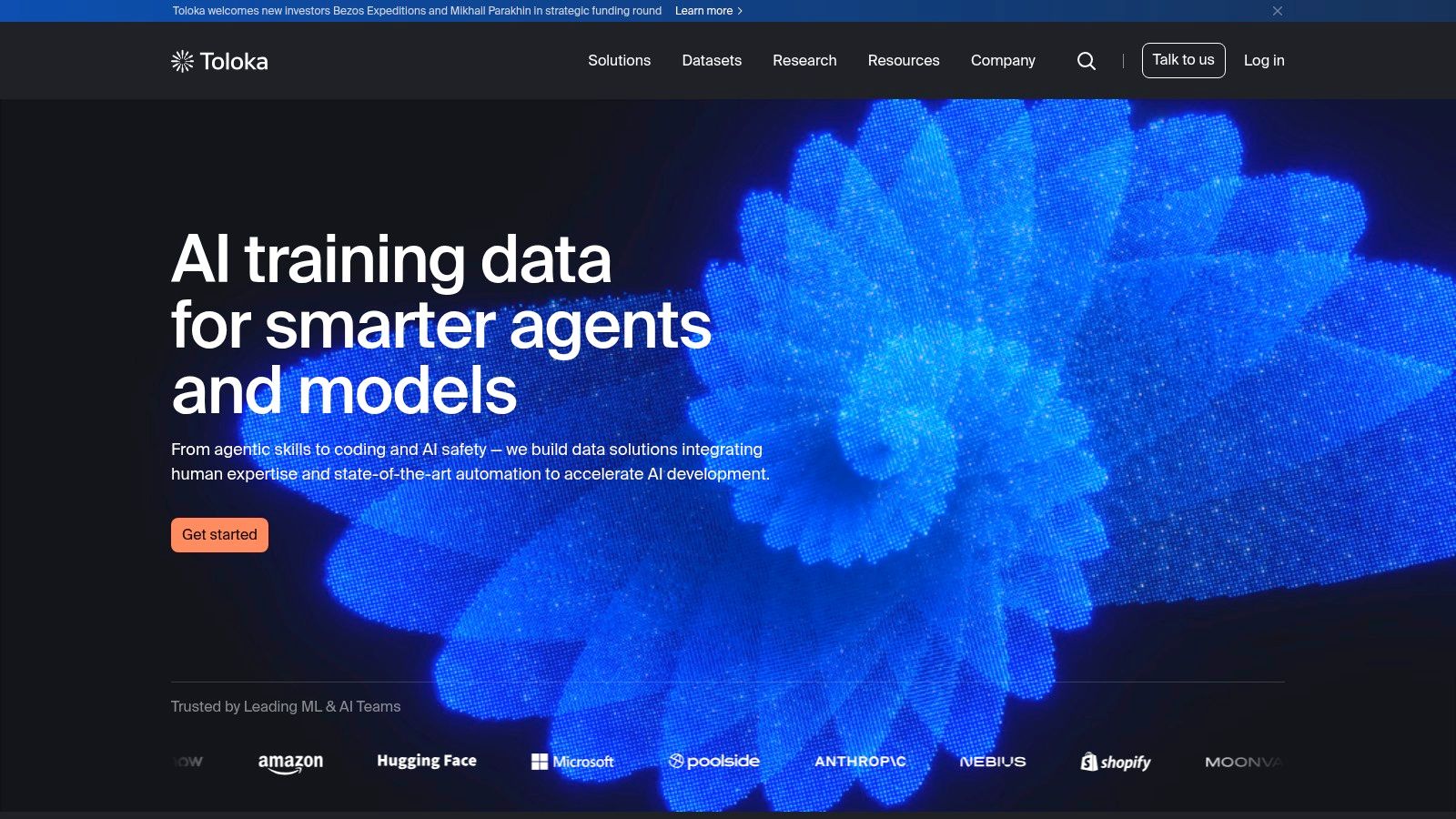
What makes Toloka stand out is its powerful quality control engine and flexibility. In self-service mode, users can design tasks, set up sophisticated quality rules like majority vote and honeypots, and filter the crowd based on skills or demographics. For those requiring guaranteed outcomes, the managed service offers fixed-price labeling with service-level agreements (SLAs), taking the project management and quality assurance burden off the client's hands. This dual approach makes Toloka one of the more accessible and scalable image annotation services for both startups and large enterprises.
Key Considerations
Toloka’s main strength lies in its ability to rapidly scale data labeling tasks using its massive crowd. The distinction between a hands-on, pay-as-you-go self-service tool and a fully managed, outcome-based service provides a clear path for projects as they evolve.
- Pros:
- Fast Ramp-Up: Leverage a large, on-demand global workforce to start projects quickly.
- Flexible Models: Clear choice between self-service for control and managed services for convenience.
- Accessible Pricing: Pay-as-you-go options are ideal for small pilots and initial experiments.
- Cons:
- Quality Variance: In self-service mode, annotation quality is highly dependent on task design and quality control setup.
- Complexity Management: Advanced image annotation tasks may necessitate engaging the managed service for best results.
Website: https://toloka.ai/
12. Appen
Appen is one of the most established players in the data annotation industry, offering a comprehensive platform backed by a global crowd of over one million skilled contractors. The company provides both a self-service platform and fully managed services, catering to a wide range of project sizes and complexities. Its strength lies in its ability to handle large-scale, multimodal data annotation needs, from images and video to text and audio, making it a versatile partner for diverse AI initiatives.
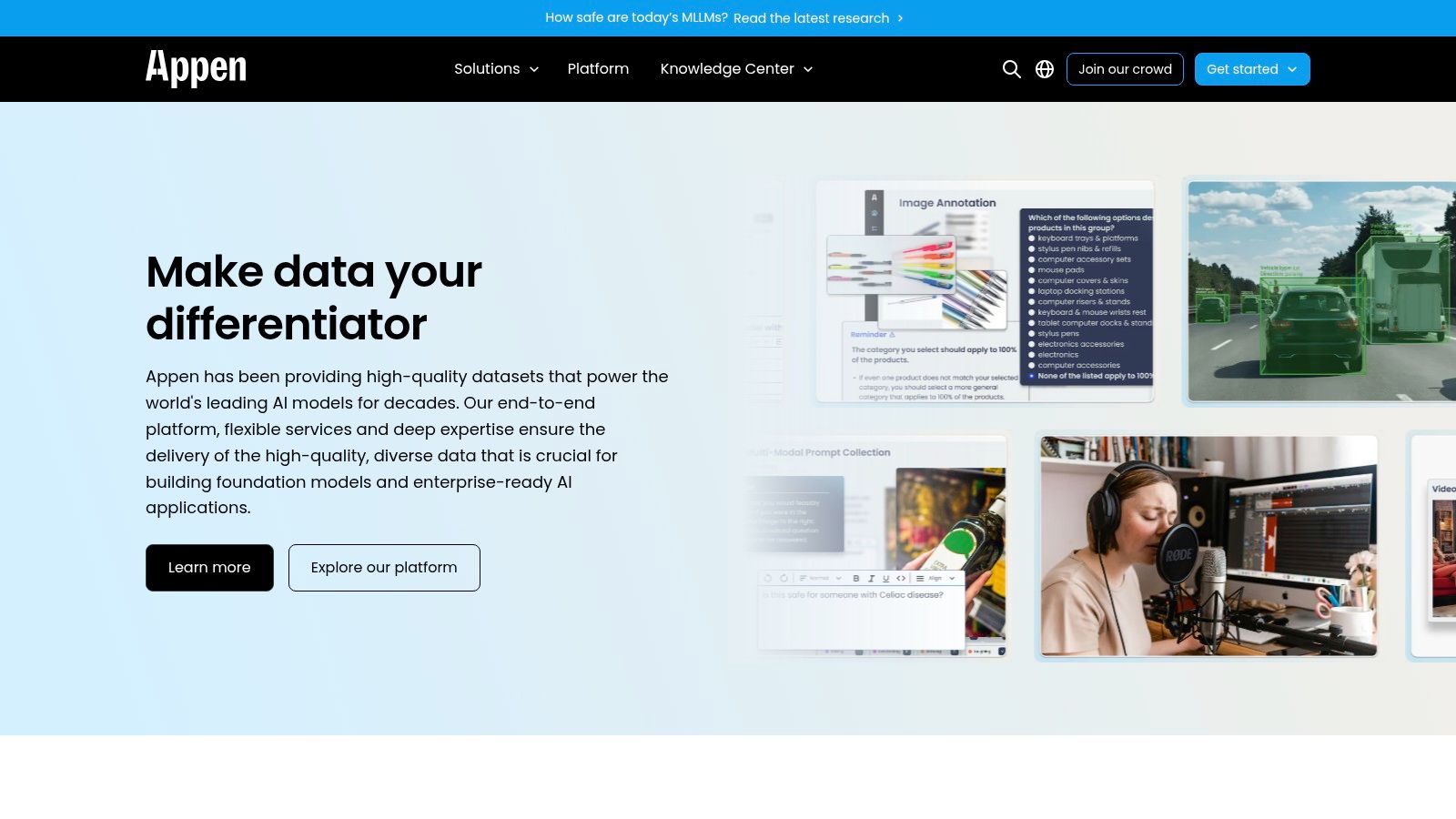
What distinguishes Appen is its massive, diverse workforce combined with mature, ML-assisted tooling. Features like smart labeling and object tracking accelerate the annotation process, improving efficiency for complex tasks. Appen also addresses critical compliance needs by offering a US-only workforce, which is essential for projects involving sensitive data or subject to specific regulatory requirements. This blend of scale, technology, and security makes it a go-to provider for enterprises that need reliable and high-volume image annotation services without compromising on data privacy or project timelines. For projects demanding a robust combination of human expertise and technological support, Appen's model offers a compelling solution.
Key Considerations
Appen’s primary advantage is its immense scale and experience in managing complex data pipelines for enterprise clients. The platform is designed to support the entire AI lifecycle, from data collection to model evaluation.
- Pros:
- Extensive Workforce: Access to a vast global crowd with extensive language and demographic coverage.
- Mature ML-Assisted Tools: Smart labeling features accelerate annotation speed and improve consistency.
- Secure & Compliant: Offers a dedicated US-only workforce option for sensitive data projects.
- Cons:
- Variable Pricing: Costs are determined by project scope and are not publicly listed, requiring a quote.
- Quality Assurance Needed: Given the crowd-based model, consistent quality requires careful project setup and rigorous QA.
Website: https://www.appen.com/
Image Annotation Services Comparison of Top 12 Providers
| Service | Core Features / Capabilities | User Experience / Quality ★ | Value Proposition 💰 | Target Audience 👥 | Unique Selling Points ✨ |
|---|---|---|---|---|---|
| Zilo AI Image Annotation | Bounding boxes, polygons, keypoints, segmentation | ★★★★☆ Expert accuracy, proven | 💰 Quote-based, flexible solutions | 👥 Businesses needing expert data | ✨ Skilled linguistics + tech experts |
| AWS SageMaker Ground Truth | Human-in-the-loop, auto-labeling, AWS integration | ★★★★ Enterprise-grade security | 💰 Quote-based, optimized for AWS users | 👥 AWS ecosystem users | ✨ Tight AWS tooling + automation |
| Labelbox | Image/video annotation, auto-labeling, marketplace | ★★★★ Mature workflows, automation | 💰 Transparent unit-based pricing | 👥 Software + labeling buyers | ✨ Combined software & on-demand labeling |
| Scale AI | End-to-end data engine, domain experts, quality control | ★★★★★ Enterprise reliability | 💰 Quote-based, enterprise-level | 👥 Large-scale enterprise clients | ✨ Rigorous quality & large volume capacity |
| SuperAnnotate | Advanced CV tooling, SAM-powered tools, compliance | ★★★★ Fast, modern, secure | 💰 Demo/quote needed | 👥 Enterprises with sensitive data | ✨ Advanced automation + compliance |
| Label Studio (HumanSignal) | Configurable CV tasks, ML-assisted labeling, open-source | ★★★★ Large community support | 💰 Free tier + Starter Cloud pricing | 👥 Small to enterprise teams | ✨ Open-source + flexible deployment |
| CVAT.ai | Full CV toolbox, SaaS & enterprise versions | ★★★★ Free & affordable SaaS | 💰 Free OSS + affordable SaaS tiers | 👥 Developers & small teams | ✨ Multi-format exports + professional services |
| Dataloop.ai | Automation, workforce management, pipelines | ★★★★ Strong automation pipelines | 💰 Quote/demo required | 👥 Large teams, continuous ops | ✨ Continuous data ops + orchestration |
| Sama | In-house workforce, biometric security, QA frameworks | ★★★★★ High accuracy & compliance | 💰 Quote-only, enterprise focus | 👥 Security-conscious enterprises | ✨ Biometric security + high QA standards |
| iMerit | Industry-focused annotation, domain experts | ★★★★ Deep vertical expertise | 💰 Custom quotes, long lead times | 👥 Specialized industry clients | ✨ US-focused, complex taxonomy expertise |
| Toloka | Crowd workforce, self-service & managed modes | ★★★ Good quality controls | 💰 Pay-as-you-go, SLA options | 👥 Flexible scale users | ✨ Large global crowd, hybrid model |
| Appen | Multimodal annotation, US-only workforce option | ★★★★ Large diverse workforce | 💰 Custom pricing, enterprise focus | 👥 Compliance-focused enterprises | ✨ US-only workforce + ML-assisted tooling |
Final Thoughts
Navigating the landscape of image annotation services can feel like an overwhelming task, but as we've explored, the right partner can fundamentally accelerate your AI and machine learning initiatives. From open-source powerhouses like CVAT and Label Studio to enterprise-grade platforms such as Scale AI and Amazon SageMaker Ground Truth, the market offers a solution for nearly every conceivable project scale, budget, and technical requirement.
The journey from raw, unstructured visual data to high-quality, model-ready training datasets is a critical one. Your choice of an annotation service isn't just a procurement decision; it's a strategic investment in the accuracy, reliability, and ultimate success of your computer vision models. The detailed breakdowns of tools like Labelbox, SuperAnnotate, and Dataloop.ai illustrate that the best choice often hinges on nuanced factors like workflow automation, quality control mechanisms, and integration capabilities with your existing MLOps stack.
Key Takeaways and Your Next Steps
As you move forward, distill the extensive information from this guide into a focused evaluation strategy. The core challenge is not just finding a tool that can label images, but finding a service that aligns perfectly with your project's specific demands.
Here are the most important takeaways to guide your decision-making process:
- Define Your Core Need: Are you an early-stage startup needing a flexible, low-cost solution like Label Studio, or a large enterprise requiring the scalable, managed workforce and robust security of a provider like Sama or iMerit? Your operational scale is the first filter.
- Balance Platform vs. People: Differentiate between pure SaaS platforms that empower your internal teams (Labelbox, SuperAnnotate) and fully managed "data-as-a-service" providers (Scale AI, Appen). Your decision depends on whether you have an in-house annotation team or need to outsource the entire labeling workforce.
- Quality is Non-Negotiable: The most advanced platform is useless if the final annotations are inaccurate. Scrutinize the quality assurance (QA) and quality control (QC) features of any service. Look for consensus mechanisms, automated checks, and robust review workflows. This is where many projects succeed or fail.
- Consider the Full Lifecycle: Annotation is not a one-off task. Think about data management, versioning, and how easily you can iterate on your labeling schemas. Platforms like Dataloop.ai are built around this holistic, data-centric AI approach, which is crucial for long-term projects.
Making the Right Choice for Your Use Case
To translate these takeaways into action, consider your specific industry and project goals. A medical AI company working with DICOM imagery has vastly different security and annotation needs than an e-commerce business labeling product photos for a recommendation engine.
Ask yourself these critical questions:
- What level of annotation complexity do I need? Simple bounding boxes, or intricate semantic segmentation and panoptic segmentation?
- How important is workforce management? Do I need to manage annotators, or do I want a service that handles all human resourcing?
- What is my budget structure? Am I looking for a predictable subscription fee, or a pay-per-annotation model?
- How will this service integrate with my existing cloud storage and model training pipelines?
Answering these questions will help you narrow down the extensive list of image annotation services to a shortlist of 2-3 top contenders. From there, initiate demos, run pilot projects with a small data sample, and engage with their support teams to make your final, informed decision. The path to building a powerful computer vision model begins with exceptionally labeled data, and selecting the right partner is your first and most critical step on that journey.
Ready to move from evaluation to execution with a partner dedicated to delivering pixel-perfect data? Zilo AI combines a powerful annotation platform with a meticulously trained and managed workforce to provide high-quality, scalable image annotation services tailored to your project's unique demands. Discover how we can accelerate your AI development by visiting Zilo AI today.

